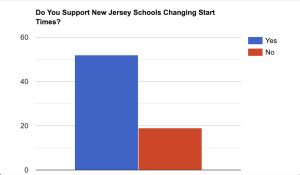Against change
May 13, 2022
A bill introduced to New Jersey legislation in March 2022 suggests schools in the state adjust start times to no earlier than 8:30 A.M. The goal of this bill would be to allow students additional time to get more sleep and promote overall wellness of students.
While these goals are of course something all schools should aim for, there are better ways to go about rather than completely altering the schedule students are accustomed to.
Most New Jersey high school students begin school between 7:20 and 7:40 A.M, resulting in most schools dismissing prior to 3:00 P.M. Naturally, students have become acclimated to this schedule over the many years it has been in place.
Students base many aspects of their life around this schedule, most particularly students who work after school. Research concludes that around thirty percent of high school students work, meaning this would largely impact a great portion of BHS students.
As BHS is conveniently located in the center of town, surrounded by plenty of businesses, many students are able to walk or drive to work directly following school. Were school hours to be adjusted, these working students schedules would also have to be altered, accounting for the additional hour or more spent in school during the afternoon.
For some of the town’s small businesses, this could make a huge difference. For some students, it may completely throw off their typical work schedules, and present great issues for all parties involved.
For students who work outside of Bernardsville, this issue is exaggerated even more so, as it already requires additional time to travel from out of town, meaning they’d be arriving to work later- either working later hours to compensate or losing time they could have been getting paid for.
It is clear that these altered schedules will impact students’ lives outside of school, but it also presents challenges for after school activities, especially sports.
While if the entire state moves to later start, it seems there won’t be an issue coordinating games with opposing schools teams, however it actually introduces a plethora of new complications.
The first issue being, as afternoon practices stretch later and later into the evening, sunlight is lost- especially in the winter. For outdoor sports, this limits the ability to practice and play.
Assistant Principal Mr. Hoppe states, “Without a lit field, it would impact sub-varsity games. Everyone thinks that we have lights that we can roll out, but our lights are substandard for field hockey and boys lacrosse. We actually aren’t allowed to use our lights for those sports at the state level- the visibility isn’t what it should be.”
Another thing to be considered would be clashing schedules between school organized sports and town-wide programs. Mr. Hoppe says, “there’s going to be a conflict between high school athletic programs and town athletic programs, for kids who are playing in both, that would be a problem, something would have to give.”
This means that students’ abilities to participate in multiple sports, programs, or after school activities will actually become more limited than it was when operating on the usual schedule, counteracting the intended goal of giving students more time to relax or look after themselves.
Especially given that high school students’ days will end up extended to make up for time they lose after school. Students may fall into the cyclical pattern, led to believe that since school starts later, they can work later, practice later, study later, go to bed later. For this reason, the idea of pushing back start times can become a slippery slope. Once pushed back, students can and will find a way to remain tired while at school.
Moreover, transportation will become even more complicated in organizing. Throughout the past couple of years New Jersey has already been facing staff shortages, and schools have seen this manifest as a severe shortage of bus drivers.
If the high school were to start later, Mr. Hoppe clarifies how this would impact transportation, “Most people don’t realize that our buses run the high school and the middle school, then they do the elementary runs. So if we’re gonna start high school an hour earlier (similar to Bedwell) we’re gonna need another bus run. There’s already a shortage of bus drivers- so it’s gonna cost our taxpayers a lot of money.”
With all of these complications to consider, it is important to understand that while the intention of this legislation is to help high school students, it will have unintended consequences that do the exact opposite of what it had originally intended to accomplish. School start times should remain how they are, as pushing them back after years of being previously established will only further complicate students’ already busy schedules and lives.


